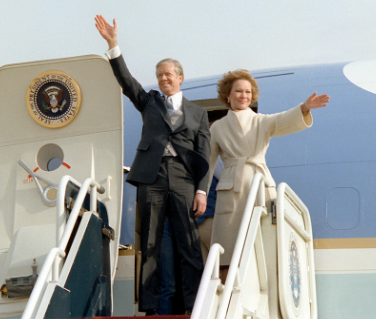By Jessica A. Dennehy
Jimmy Carter, the 39th president of the United States, passed away on December 29, 2024. He was 100. With his death, he broke a myriad of American records: the longest-living president, the longest presidential marriage, and arguably, the most impactful post-presidency. From the son of a peanut farmer in Georgia to a Nobel Peace Prize laureate, his life’s lofty accomplishments remained rooted in his humble upbringing.
James Earl Carter, Jr., better known as Jimmy Carter, was born on October 1, 1924, in Plains, Georgia. Raised as a devout Baptist, he was interested in both politics and peanut farming from a young age. After graduating from the Naval Academy in 1946, he married Rosalynn Smith, with their marriage lasting for 77 years and resulting in four children: Jack, Chip, Jeff, and Amy. Jimmy and Roselynn Carter’s marriage is the longest-lasting presidential marriage in the history of the United States; the next longest belonged to George H.W. Bush, at 73 years. After serving seven years in the Navy, Carter returned to his hometown of Plains, Georgia in 1962, entering state politics shortly afterwards. He eventually became the Governor of Georgia in 1970 and gained national attention for his emphasis on ecology, government efficiency, and removing racial barriers. The culmination of his political career arrived when Carter announced his candidacy for President in December of 1974. He served as the Democratic nominee with his running mate Senator Walter F. Mondale of Minnesota. Campaigning against the incumbent President Gerald R. Ford, Carter eventually won the presidency with 297 electoral votes to Ford’s 241.
Although Carter was only a single-term president, his domestic policies have had a lasting impact on the federal government. He was responsible for the creation of the Department of Education and played a pivotal role in expanding the national park system to include an additional 103 million acres of land in Alaska. Prioritizing civil service reform, he stuck to his Georgian promise to increase government efficiency, appointing a record number of women, African Americans, and Hispanics to government positions in the process. Carter’s peace-keeping efforts on the international stage, however, were among his most notable achievements as President. In 1978, he helped orchestrate the signing of the Camp David Accords, which brought amnesty between Egypt and Israel. He also succeeded in obtaining ratification of the Panama Canal treaties, which granted long-promised control of the canal to Panama. While treaty-making, Carter additionally established full diplomatic relations with China and the Soviet Union, negotiating the SALT II nuclear arms treaty with the latter. However, the accomplishments of Carter’s presidency were marred by the Iran Hostage Crisis of 1979, where U.S. embassy staff were held hostage in Tehran for the final 14 months of his term. This crisis, coupled with high inflation and interest rates, significantly weakened Carter’s re-election campaign, to the point that Ronald Reagan won the presidency in 1980.
Following his defeat, Jimmy Carter began arguably the most extraordinary post-presidential career in American history. In 1982, a year after leaving office, he founded the Carter Center alongside his wife Rosalynn. The Carter Center is a still-active nonprofit dedicated to the alleviation of human suffering, the promotion of democracy, and the improvement of global health. In 1986, under the Reagan administration, Carter had successfully negotiated the release of political prisoners in Nicaragua. In 1994, under the Clinton administration, he helped negotiate the de-escalation of nuclear tensions on the Korean Peninsula. His long-stand diplomatic and humanitarian efforts earned him global recognition, culminating in his receiving of the 2002 Nobel Peace Prize for his work in conflict resolution and promoting human rights. In the aftermath of this accomplishment, Carter’s diplomatic efforts continued: in 2010, under the Obama administration, he secured the release of American Aijalon Mahli Gomes from North Korea.
Even as he faced a public battle with cancer in 2015, Jimmy Carter continuously advocated for global health initiatives and humanitarian causes. His global contributions have still kept him close to home, though. A long-time resident of Plains, Carter maintained a deep commitment to his faith and education, teaching Sunday School at Maranatha Baptist Church and serving as a professor at Emory University in Atlanta for nearly 40 years.

